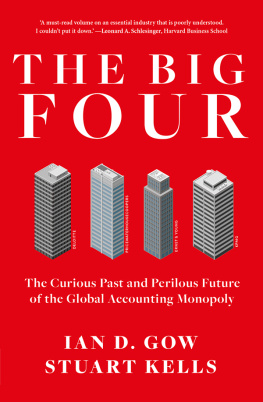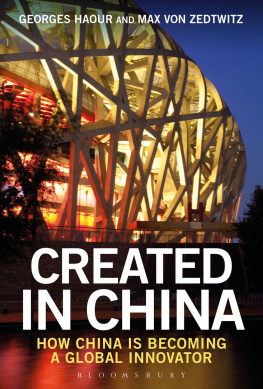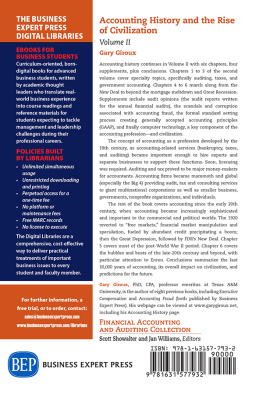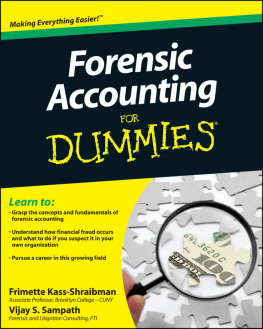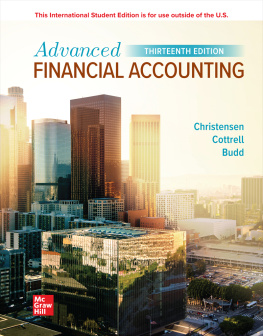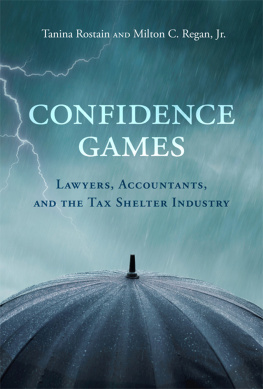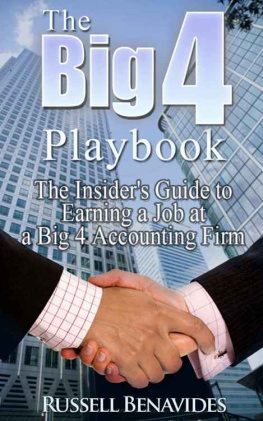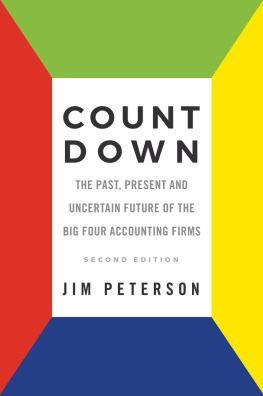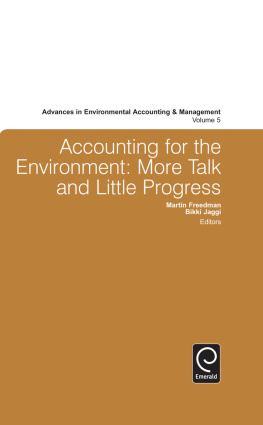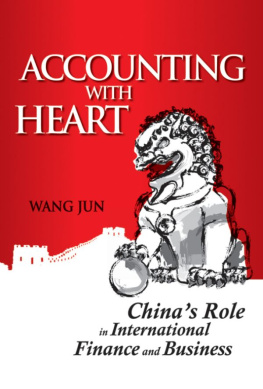
Published by La Trobe University Press
in conjunction with Black Inc.
Level 1, 221 Drummond Street
Carlton VIC 3053, Australia
www.blackincbooks.com
Copyright Stuart Kells and Ian D. Gow 2018
Stuart Kells and Ian D. Gow assert their right to be known as the authors of this work.
ALL RIGHTS RESERVED.
No part of this publication may be reproduced, stored in a retrieval system, or transmitted in any form by any means electronic, mechanical, photocopying, recording or otherwise without the prior consent of the publishers.
9781863959964 (paperback)
9781743820285 (ebook)
 | A catalogue record for this book is available from the National Library of Australia |
Cover design by Kim Ferguson
Text design and typesetting by Tristan Main
Cover image enjoynz / Getty Images
Prelude
SCIENCE, MAGIC AND THE PREHISTORY OF THE BIG FOUR
Founded in the nineteenth century as the worlds first national accounting body, the Institute of Chartered Accountants in England and Wales quickly established a dining club, sports clubs and a library. Among the librarys first acquisitions was a copy of Luca Paciolis ground-breaking Renaissance book of practical mathematics, Summa de Arithmetica (1494).
Summa de Arithmetica explains how to manage ledgers, inventories, liabilities and expense accounts. As well as pioneering the use of HinduArabic numerals in Europe, it helped popularise double-entry accounting. For every credit in a ledger, Pacioli wrote, there must also be a debit. The enlightened author encouraged entrepreneurs to stop consulting astrologers and recluses for advice about this or that venture; all a merchant needed to succeed, Pacioli counselled, was access to cash, a good bookkeeper and an up-to-date system of accounts.
Pacioli belonged to a noble tradition of scholarship. Bookkeeping along with cartography, perspective and ballistics was one of the first sciences of the scientific revolution. The German polymath Johann Wolfgang von Goethe considered double-entry bookkeeping amongst the finest inventions of the human mind.
Curiously, the careful counting of money preceded the careful measurement of lunar movements and accelerating cannonballs. The physical sciences, such as astronomy and physics, drew heavily on fiscal precedents: several pioneer physicists and cosmographers had also learned economics and accounting. Copernicus, for example, wrote on monetary reform as well as on the planets. Galileo taught bookkeeping, and learnt much from the field.
In the early days of science, numbers were put to all manner of purposes, practical and impractical. The first Latin and Italian books on arithmetic also instructed their readers on conjuring, astrology, thaumaturgy, games, jests, curses and black magic. As we look back with modern eyes, the line between early mathematics and magic appears strikingly fine; indeed, the relationship between math and the occult has a long history. Early in the fifth century, St Augustine issued a warning: The good Christian should beware of mathematicians and all those who make empty prophecies. The danger already exists that mathematicians have made a covenant with the devil to darken the spirit and confine man in the bonds of Hell.
When, in the thirteenth century, Roger Bacon advocated the adoption of the HinduArabic numerals, the church accused him of practising magic and condemned him to life in prison. Long after those strange-looking numerals arrived in Europe, they were still seen as exotic, even disreputable. The numerals, though, were a boon for Western culture. Much more practical and versatile than the Roman ones, the Asian numerals opened the way for modern mathematics, and hence modern accounting.
Double-entry bookkeeping rests on a tautology: the value of an organisations assets must equal the claims of creditors and owners to those assets. This was a new idea. Earlier financial records reflected a very different philosophy. The Domesday Book of 1086, for example, is a set of simple lists that assert King Williams property rights, ecclesiastical rights, legal privileges, taxes and commitments. It is not a balanced schedule of debits and credits. Absolute rulers were more interested in counting their gold than in tallying their debts that is, in reckoning what they owned rather than what they owed. The rise of double-entry among bankers and merchants in the late medieval period reflected the tectonic social, political and economic changes of the age, and the shift of power to the men and women who energised the Renaissance.
The Pacioli volume became one of the most valued possessions of the Institute of Chartered Accountants, both for its ground-breaking content and for its worth on the rare book market. An incunabulum (meaning it was printed before 1501), the book is today appreciated as one of the earliest printed volumes about numbers. Another copy, finely bound in vellum and recently found in an old cupboard, sold at a Milan book auction for 530,000 euros. These volumes are rare survivors: most other copies from the 1494 edition were read to pieces by teachers, students, bookkeepers and merchants.
The institutes other treasures include Nieuwe Instructie (Antwerp, 1543), a work whose translation into French and English helped spread double-entry accounting to Western Europe (the author was Jan Ympyn Christoffels, a travelling silk trader), and the only surviving complete copy of The maner and fourme how to kepe a perfecte reconying (London, 1553), written by James Peele and adorned with elegant sample ledgers.
The institutes collection would be described in 1966 as the worlds most complete library devoted to accounting and allied subjects. It is a monument to a powerful principle: that sound bookkeeping is the foundation of success in statecraft and in commerce. The modern accounting profession was built upon this principle. Firms promised to guide their clients through a perilous terrain, and towards a noble goal. The four largest accounting and audit firms have profited spectacularly from widespread confidence in this idea. How well founded is that confidence? How fit are the big firms as trustworthy guides? And how stable is their position as the heirs to Pacioli and Christoffel and Peele?
________________
He also taught the new mathematics of fortification, such as how to build star forts to withstand artillery.
The mathematician Carl Friedrich Gauss is said to have pointed out an error in his fathers financial calculations at the age of three.
INTRODUCTION
Stretching back centuries, the history of Deloitte, EY, KPMG and PwC is a fascinating story of wealth, power and luck. In many profound ways, the so-called Big Four accounting and audit firms have influenced how we work, how we manage, how we invest and how we are governed.
The firms have been called many things. High priests of capitalism. More powerful than sovereign states. Protectors of the public interest. The conscience of the free market. Heroes of corporate integrity. Benign watchdogs. Toothless lapdogs. A necessary evil. An institutionalised oligopoly. Corporate sweatshops. Accountants of fortune. Skilled enablers of white-collar fraud. Each of the Big Four is a case study of corporate triumph and drama. Underneath their polished images are colourful tales of commercial success, but also of ethical compromises, professional angst, botched ventures, debauched parties, scandalous marriages, disreputable interests and arcane rites.
In a field that is seen as somewhat beige and lacking in prestige, the Big Four are the glamour boys, the glowing success stories of their field. In 2011 their total revenue broke emphatically through the US$100 billion mark. Since then it has kept on rising, surpassing US$130 billion in 2016. In that year, before a regrettable incident at the 2017 Oscars, PwC ranked alongside Disney, Nike and Lego as one of the ten most powerful brands in the world.
Next page
